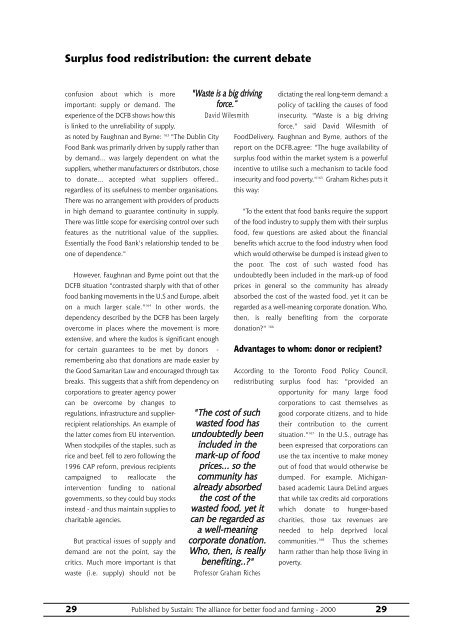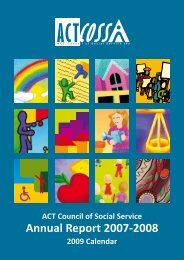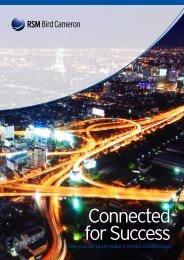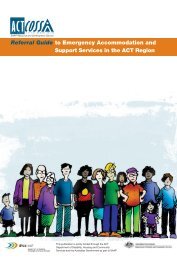Too much and too little? Debates on surplus food redistribution
Too much and too little? Debates on surplus food redistribution
Too much and too little? Debates on surplus food redistribution
You also want an ePaper? Increase the reach of your titles
YUMPU automatically turns print PDFs into web optimized ePapers that Google loves.
Surplus <strong>food</strong> redistributi<strong>on</strong>: the current debate<br />
c<strong>on</strong>fusi<strong>on</strong> about which is more<br />
important: supply or dem<str<strong>on</strong>g>and</str<strong>on</strong>g>. The<br />
experience of the DCFB shows how this<br />
is linked to the unreliability of supply,<br />
as noted by Faughnan <str<strong>on</strong>g>and</str<strong>on</strong>g> Byrne: 163 "The Dublin City<br />
Food Bank was primarily driven by supply rather than<br />
by dem<str<strong>on</strong>g>and</str<strong>on</strong>g>... was largely dependent <strong>on</strong> what the<br />
suppliers, whether manufacturers or distributors, chose<br />
to d<strong>on</strong>ate... accepted what suppliers offered..<br />
regardless of its usefulness to member organisati<strong>on</strong>s.<br />
There was no arrangement with providers of products<br />
in high dem<str<strong>on</strong>g>and</str<strong>on</strong>g> to guarantee c<strong>on</strong>tinuity in supply.<br />
There was <str<strong>on</strong>g>little</str<strong>on</strong>g> scope for exercising c<strong>on</strong>trol over such<br />
features as the nutriti<strong>on</strong>al value of the supplies.<br />
Essentially the Food Bank's relati<strong>on</strong>ship tended to be<br />
<strong>on</strong>e of dependence."<br />
However, Faughnan <str<strong>on</strong>g>and</str<strong>on</strong>g> Byrne point out that the<br />
DCFB situati<strong>on</strong> "c<strong>on</strong>trasted sharply with that of other<br />
<strong>food</strong> banking movements in the U.S <str<strong>on</strong>g>and</str<strong>on</strong>g> Europe, albeit<br />
<strong>on</strong> a <str<strong>on</strong>g>much</str<strong>on</strong>g> larger scale." 164 In other words, the<br />
dependency described by the DCFB has been largely<br />
overcome in places where the movement is more<br />
extensive, <str<strong>on</strong>g>and</str<strong>on</strong>g> where the kudos is significant enough<br />
for certain guarantees to be met by d<strong>on</strong>ors -<br />
remembering also that d<strong>on</strong>ati<strong>on</strong>s are made easier by<br />
the Good Samaritan Law <str<strong>on</strong>g>and</str<strong>on</strong>g> encouraged through tax<br />
breaks. This suggests that a shift from dependency <strong>on</strong><br />
corporati<strong>on</strong>s to greater agency power<br />
can be overcome by changes to<br />
regulati<strong>on</strong>s, infrastructure <str<strong>on</strong>g>and</str<strong>on</strong>g> supplierrecipient<br />
relati<strong>on</strong>ships. An example of<br />
the latter comes from EU interventi<strong>on</strong>.<br />
When stockpiles of the staples, such as<br />
rice <str<strong>on</strong>g>and</str<strong>on</strong>g> beef, fell to zero following the<br />
1996 CAP reform, previous recipients<br />
campaigned to reallocate the<br />
interventi<strong>on</strong> funding to nati<strong>on</strong>al<br />
governments, so they could buy stocks<br />
instead - <str<strong>on</strong>g>and</str<strong>on</strong>g> thus maintain supplies to<br />
charitable agencies.<br />
But practical issues of supply <str<strong>on</strong>g>and</str<strong>on</strong>g><br />
dem<str<strong>on</strong>g>and</str<strong>on</strong>g> are not the point, say the<br />
critics. Much more important is that<br />
waste (i.e. supply) should not be<br />
29<br />
""WWaassttee iiss aa bbiigg ddrriivviinngg<br />
ffoorrccee..””<br />
David Wilesmith<br />
dictating the real l<strong>on</strong>g-term dem<str<strong>on</strong>g>and</str<strong>on</strong>g>: a<br />
policy of tackling the causes of <strong>food</strong><br />
insecurity. "Waste is a big driving<br />
force," said David Wilesmith of<br />
FoodDelivery. Faughnan <str<strong>on</strong>g>and</str<strong>on</strong>g> Byrne, authors of the<br />
report <strong>on</strong> the DCFB,agree: "The huge availability of<br />
<strong>surplus</strong> <strong>food</strong> within the market system is a powerful<br />
incentive to utilise such a mechanism to tackle <strong>food</strong><br />
insecurity <str<strong>on</strong>g>and</str<strong>on</strong>g> <strong>food</strong> poverty." 165 Graham Riches puts it<br />
this way:<br />
"To the extent that <strong>food</strong> banks require the support<br />
of the <strong>food</strong> industry to supply them with their <strong>surplus</strong><br />
<strong>food</strong>, few questi<strong>on</strong>s are asked about the financial<br />
benefits which accrue to the <strong>food</strong> industry when <strong>food</strong><br />
which would otherwise be dumped is instead given to<br />
the poor. The cost of such wasted <strong>food</strong> has<br />
undoubtedly been included in the mark-up of <strong>food</strong><br />
prices in general so the community has already<br />
absorbed the cost of the wasted <strong>food</strong>, yet it can be<br />
regarded as a well-meaning corporate d<strong>on</strong>ati<strong>on</strong>. Who,<br />
then, is really benefiting from the corporate<br />
d<strong>on</strong>ati<strong>on</strong>?" 166<br />
""TThhee ccoosstt ooff ssuucchh<br />
wwaasstteedd ffoooodd hhaass<br />
uunnddoouubbtteeddllyy bbeeeenn<br />
iinncclluuddeedd iinn tthhee<br />
mmaarrkk--uupp ooff ffoooodd<br />
pprriicceess...... ssoo tthhee<br />
ccoommmmuunniittyy hhaass<br />
aallrreeaaddyy aabbssoorrbbeedd<br />
tthhee ccoosstt ooff tthhee<br />
wwaasstteedd ffoooodd,, yyeett iitt<br />
ccaann bbee rreeggaarrddeedd aass<br />
aa wweellll--mmeeaanniinngg<br />
ccoorrppoorraattee ddo<strong>on</strong>naattiio<strong>on</strong>n..<br />
WWhhoo,, tthheenn,, iiss rreeaallllyy<br />
bbeenneeffiittiinngg....??""<br />
Professor Graham Riches<br />
Advantages to whom: d<strong>on</strong>or or recipient?<br />
According to the Tor<strong>on</strong>to Food Policy Council,<br />
redistributing <strong>surplus</strong> <strong>food</strong> has: "provided an<br />
opportunity for many large <strong>food</strong><br />
corporati<strong>on</strong>s to cast themselves as<br />
good corporate citizens, <str<strong>on</strong>g>and</str<strong>on</strong>g> to hide<br />
their c<strong>on</strong>tributi<strong>on</strong> to the current<br />
situati<strong>on</strong>." 167 In the U.S., outrage has<br />
been expressed that corporati<strong>on</strong>s can<br />
use the tax incentive to make m<strong>on</strong>ey<br />
out of <strong>food</strong> that would otherwise be<br />
dumped. For example, Michiganbased<br />
academic Laura DeLind argues<br />
that while tax credits aid corporati<strong>on</strong>s<br />
which d<strong>on</strong>ate to hunger-based<br />
charities, those tax revenues are<br />
needed to help deprived local<br />
communities. 168 Thus the schemes<br />
harm rather than help those living in<br />
poverty.<br />
Published by Sustain: The alliance for better <strong>food</strong> <str<strong>on</strong>g>and</str<strong>on</strong>g> farming - 2000 29













